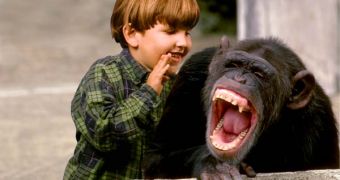It seems so human, still laugh is not specific to humans. Monkeys, rats and dogs have already been found to enjoy a good "laugh". But it is hard to penetrate into their mind to see what a rat or dog could think when "laughing". Perhaps they think we, humans, are ugly... Anyway, laughing seems to be connected to a high development of the brain, and only some mammals are known to laugh. Laughing hyena surely not, nor the laughing dove.
It seems that we, the humans, have been able to laugh for many millions of years, and not since we turned into humans. Neural circuits for laughter exist in very ancient regions of the brain, and ancestral forms of play and laughter existed in other animals eons before we humans came across their bursts of laugh.
It is clear that apes do laugh, pointing they indeed have self awareness. Researchers compare the intelligence of adult apes with that of a 6 year-old child and attribute them personhood. When chimps play and chase each other, they pant in a manner that is strikingly like human laughter.
Not only chimps, the closest apes to men, laugh. Orangutans too possess a sense of empathy and mimicry essential for a laughter and this pushes the age of human laughter to at least 12-16 million years ago, when orangutans split from the line that led to humans, chimps and gorillas.
Facial expressions, like the open mouth resembling laughter, have been observed in orangutans. The speed of the imitation (0.4 seconds) revealed that those expressions were involuntary, thus orangutan laughing is contagious.
When one orangutan shows the open, gaping mouth, its playmate responds with the same expression in most of the occasions, a behavior called "emotional contagion" in humans, a form of empathy that permits us to experience the emotions of those around us. But not every ape would smile back, this behavior being conditioned by social factors similar to humans': orangutans are more likely to return a smile to friends than to strangers.
Dog lovers know that dogs, too, pant of joy.
And if you thought that only humans and chimps laugh when tickled, you're wrong. Mice too do it. Only that they laugh in... "ultrasounds", which humans cannot hear. Moreover, mice appear to tickle in groups, and offspring are more likely to enjoy these parties than their parents.
Rats' chirps during their playing resemble our giggles. They too, when playfully tickled, emit joyful chirps and bond socially with their human tickler, asking for more tickling and preferring the company of other chirpers. It appears that even if adult rodents have no well-developed cognitive sense of humor, young rats have a well-developed sense of fun.
Various researches confirm that laughter in animals is connected to similar play chasing, and verbal jokes could tickle ancient circuits in the human brains. More studies are necessary to explain why humans like to joke around but also how the lack of laughter leads to depression.
The fact that human laughter originated very early is another clue that it's a deep-seated instinct. Young children, whose semantic sense of humor is marginal, laugh abundantly in the midst of their other rough-and-tumble activities.
It is known that women like men that make them laugh, men like women that laugh at their jokes. Researches showed that the joker men have higher levels of testosterone, the male hormone testosterone.
In fact, male jokes tend to be more aggressive, and the most aggressive jokers are the young men. It's obvious that women joke less than men, and their jokes are less aggressive. There are clearly more male comedians than females. Men's humor is aggressive, putting down the others. Aggression is clearly connected to testosterone levels.
Men may joke aggressively because they see the elder men as a threat, attracting females' attention away from themselves. This is particularly challenging for young males entering the breeding market.

 14 DAY TRIAL //
14 DAY TRIAL //